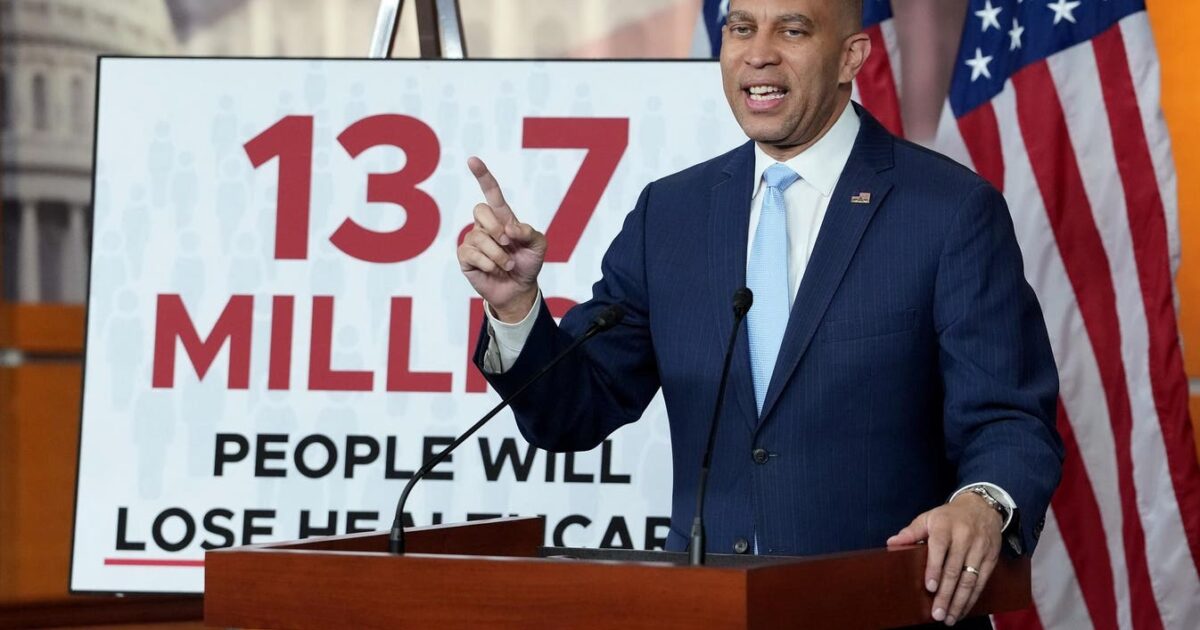CBO Says Budget Reconciliation Bill May Add 11 Million Uninsured

WASHINGTON, DC – MAY 13: U.S. House Minority Leader Hakeem Jeffires (D-NY) holds a press conference … More
The House Republican budget reconciliation legislation, dubbed “the big, beautiful bill,” could lead to nearly 11 million people losing health insurance over the next nine years, the Congressional Budget Office concluded this week. Approximately 7.8 million could lose Medicaid coverage if strict work requirements and more frequent eligibility checks are enforced, and several million more could lose coverage through changes to the Affordable Care Act exchanges.
The budget bill looks to cut $715 billion in Medicaid and $300 billion in the Supplemental Nutrition Assistance Program (formerly known as Food Stamps). The plan calls for work requirements for able-bodied childless adults and co-payments for those above 100% of the federal poverty level. The proposal also includes a tightening of eligibility verification and institutes penalties for states that provide healthcare coverage to certain immigrants.
The work requirements apply to both Medicaid and SNAP and would begin in 2026. There isn’t an especially large population of Medicaid beneficiaries who aren’t currently working, in school, or a caregiver to a loved one. A 2023 KFF report found that 71% of working-age adults on Medicaid were working full or part time or in school, while an additional 12% were caregivers. Nonetheless, the bill is projected to reduce the Medicaid rolls by nearly eight million.
And then there are the changes in the ACA marketplace that would make coverage more expensive as enhanced tax credits expire, and harder to obtain as open enrollment windows shorten, the paperwork burden increases, and automatic re-enrollment ends. Americans who purchase health coverage through the ACA marketplace exchanges could also soon face higher out-of-pocket maximums in their coverage plans, which means higher cost-sharing. The CBO projects that the marketplace changes in the budget bill could increase the number of uninsured individuals by several million more by 2034, independent of Medicaid unenrollment.
GOP lawmakers frame the cuts as a way to root out “waste, fraud, and abuse” and to strengthen the program for the “truly vulnerable.” But voters from across the political spectrum oppose the austerity plans for Medicaid and the ACA.
The House bill still must pass the Senate before becoming law. It’s likely that the Senate would alter or include “mark-ups” in the legislation prior to passage, particularly given the vocal opposition to the bill from several Republican senators.
House Minority Leader, Democrat Hakeem Jefferies, claims the aggregate increase in numbers of uninsured would tally 13.7 million. The calculation he refers to appears to add a greater number of coverage losses due to the elimination of ACA premium subsidies that help people purchase coverage. Democrat Senator Chris Murphy’s estimate of the total number of uninsured is even higher at 15 million.
Republicans such as Senator James Lankford have countered by saying that those losing Medicaid coverage would be able to obtain employer-based coverage in the private sector. He says the bill which is being considered in the Senate is “not kicking people off Medicaid. It’s transitioning from Medicaid to employer-provided healthcare. So yes, we’ve got 10 million people that are not going be on Medicaid, but they then are going be on employer-provided healthcare.” But not all employers in America offer health insurance. In fact, even among the largest employers, only around two-thirds provide health insurance options to their employees. The percentage offering health coverage among smaller employers is substantially less. Less than 50% of small employers offer insurance.
The reconciliation package that House Republicans propose would also trigger over $500 billion in automatic cuts to Medicare spending, according to the CBO. These cuts would not reduce benefits to most Medicare beneficiaries. However, they would eliminate Medicare eligibility for migrants with temporary protected status as well as refugees and asylum seekers. They would also terminate Medicare benefits for Medicaid beneficiaries who also have Medicare eligibility. In addition, there would be a mandatory 4% reduction in Medicare payments to hospitals, physicians, healthcare providers, Medicare Advantage plans and standalone prescription drug plans.
And the bill would limit the compensation pharmacy benefit managers receive in Medicare outpatient drug plans to flat “bona fide service fees,” thereby prohibiting compensation based on a drug’s price or rebate arrangements. Additionally, the legislation would establish PBM transparency and reporting requirements, including periodic data on utilization, pricing and revenues for drugs PBMs include on their formularies, as well as information on contracts with drug manufacturers and PBM-affiliated (specialty) pharmacies.
It’s unclear if the newly established rules for PBMs would save Medicare beneficiaries money. Though the regulations appear to be aimed at disrupting the rebate system, which some policymakers and lawmakers have criticized as being disadvantageous to Medicare recipients, PBMs maintain that they use rebates they extract from drug makers to lower beneficiary premiums. So, while patients’ out-of-pocket costs at the pharmacy counter for certain highly rebated drugs may go down, their premiums could increase.

